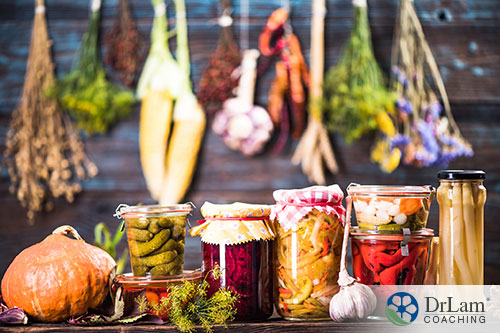 You might be a bit intimidated, or perhaps, disinterested, when someone suggests you should ferment vegetables, but once you understand the benefits and how simple it can be, you might discover a fun new kitchen project—and one that can dramatically improve your gut health. You may have already heard that eating certain foods, including fermented vegetables, can aid digestion and promote overall wellness. But we’re only just finding out how important gut health truly is.
You might be a bit intimidated, or perhaps, disinterested, when someone suggests you should ferment vegetables, but once you understand the benefits and how simple it can be, you might discover a fun new kitchen project—and one that can dramatically improve your gut health. You may have already heard that eating certain foods, including fermented vegetables, can aid digestion and promote overall wellness. But we’re only just finding out how important gut health truly is.
The most important reason to ferment vegetables is that eating them can add good bacteria to your stomach. But why do you need good bacteria? Well, good microbes, called probiotics, are extremely important and here’s why.
When we talk about bacteria, we’re usually thinking about the types that cause disease. However, your body is full of both good and bad bacteria—hopefully, fewer of the latter. Probiotics are bacteria that are good for you, and more specifically, your digestive system. They help keep your gut bacteria balanced and your digestive system working properly. However, too often, patients are instructed by their doctors to take antibiotics for an infection. However, antibiotics don’t discriminate and kill off both bad bacteria and the good, leaving your gastrointestinal (GI) tract in disarray.
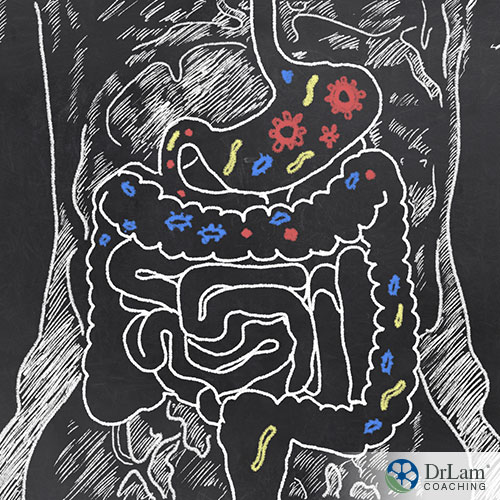 Fermented foods are full of good probiotics and can help restore order in your digestive system after a round of destructive antibiotics. So, why not ferment vegetables and add them to your diet? It’s a great way of getting your daily dose of the good bacteria you need for optimal gut health. Fermented veggies can also strengthen the immune system and help control your appetite by supporting the nerves that control movement through your gut.
Fermented foods are full of good probiotics and can help restore order in your digestive system after a round of destructive antibiotics. So, why not ferment vegetables and add them to your diet? It’s a great way of getting your daily dose of the good bacteria you need for optimal gut health. Fermented veggies can also strengthen the immune system and help control your appetite by supporting the nerves that control movement through your gut.
Studies have found that probiotics help prevent health conditions such as
Almost all fruits and vegetables have naturally occurring bacteria on their skin called Lactobacillus. When fruits or veggies are placed in an oxygen-free environment, the bacteria convert plant sugars into lactic acid. This process is what gives fermented food the characteristic tangy or sour taste that so many people like. Moreover, lactic acid prevents the growth of harmful bacteria and acts as a natural food preservative. However, food must be entirely submerged in lactic acid to avoid harmful mold growth.
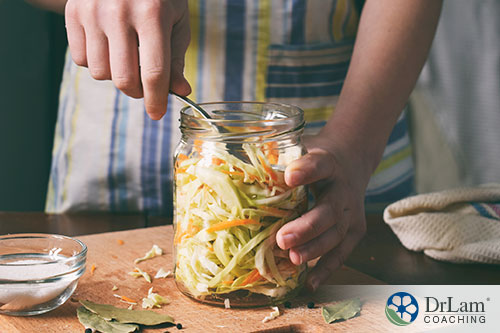 Maybe you didn’t realize it, but pickles and sauerkraut are two popular forms of fermented vegetables. But you can ferment vegetables of almost any type, but some require a bit of a different procedure. For example, because cabbages and leafy greens are full of moisture, they don’t need the saltwater solution described below. Instead, with just a small amount of salt, they create their own brine.
Maybe you didn’t realize it, but pickles and sauerkraut are two popular forms of fermented vegetables. But you can ferment vegetables of almost any type, but some require a bit of a different procedure. For example, because cabbages and leafy greens are full of moisture, they don’t need the saltwater solution described below. Instead, with just a small amount of salt, they create their own brine.
The most commonly fermented vegetables include
To ferment vegetables that have a water content higher than most, you may benefit by adding some extra ingredients like grape leaves or black tea leaves to prevent them from becoming mushy during the fermentation process.
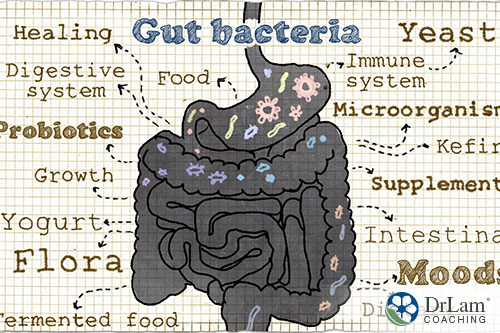 Probiotics can be found in many forms—including supplements, as well as in yogurt, kefir, and many other foods and drinks. But whether they are being used to prevent health issues or after antibiotics, probiotics can be quite costly. That’s why it’s more ideal to ferment vegetables on your own. It’s a simple yet effective way to get a big dose of probiotics into your system.
Probiotics can be found in many forms—including supplements, as well as in yogurt, kefir, and many other foods and drinks. But whether they are being used to prevent health issues or after antibiotics, probiotics can be quite costly. That’s why it’s more ideal to ferment vegetables on your own. It’s a simple yet effective way to get a big dose of probiotics into your system.
The simple formula for creating a probiotic powerhouse = vegetables + water + salt + time (a few days).
These tangy vegetable treats will last for several months if kept refrigerated. Use them as salad toppers, eat them with meats, or enjoy them as a tasty snack.
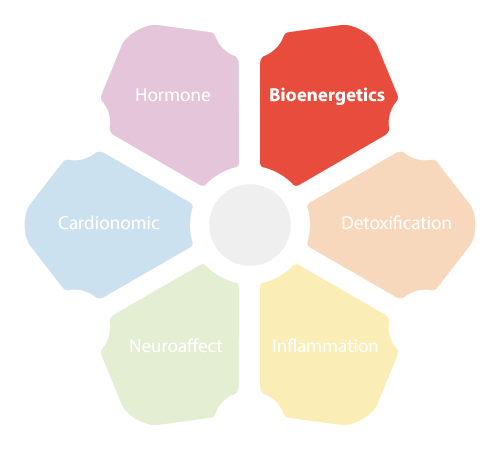 Adrenal Fatigue Syndrome (AFS) is a condition that develops when the adrenal glands become fatigued and can no longer keep up with the body’s demand for hormones—in particular, the stress hormone cortisol. The debilitating condition is usually caused by prolonged or extreme exposure to physical or psychologic stress, or both. When your body perceives stress, the NeuroEndoMetabolic (NEM) Stress Response System springs into action and activates multiple circuits to fulfill its important stress management role. Stress affects almost every cell and organ in the body, including the digestive system. That’s why taking probiotics can help speed up your AFS recovery.
Adrenal Fatigue Syndrome (AFS) is a condition that develops when the adrenal glands become fatigued and can no longer keep up with the body’s demand for hormones—in particular, the stress hormone cortisol. The debilitating condition is usually caused by prolonged or extreme exposure to physical or psychologic stress, or both. When your body perceives stress, the NeuroEndoMetabolic (NEM) Stress Response System springs into action and activates multiple circuits to fulfill its important stress management role. Stress affects almost every cell and organ in the body, including the digestive system. That’s why taking probiotics can help speed up your AFS recovery.
In fact, fermented vegetables and other probiotic-rich foods can be one of the most helpful components of your recovery. When dealing with AFS, diet and nutrient supplements are extremely important. If you’re suffering from Adrenal Fatigue, you’ll need as much help as you can get to promote sleep, aid weight loss, reduce brain fog and muscle pain, support your immune system, and rebuild your overall health. But if your digestive system is not working properly, investing in top quality foods and vitamins is a waste, which is often the case for those suffering from AFS. If your GI tract is not absorbing nutrients, your symptoms will only get worse.
For this reason, improving gut health should be one of your main goals in order to successfully recover from Adrenal Fatigue. New research shows that when you ferment vegetables and add them to your diet, the friendly bacteria that comes along with your veggies can provide AFS sufferers with more energy, healthier skin, and weight loss benefits.
The digestive system is extremely sensitive to stress. The brain and gut are intimately connected, therefore, when the brain perceives stress, it diverts energy away from digestion to focus on the immediate threat. That’s why you may get queasy if you’re anxious or worried and why you may need to use the bathroom before an important event.
Stress and anxiety can also affect the way your body breaks down and absorbs food. Eating when you’re under stress impairs gut muscle function and hinders the transport of food through your digestive system. Undigested food passing through your gut can cause numerous health issues including constipation and dysbiosis.
Almost all AFS sufferers who have spent years in a constant state of stress have some sort of digestion issue that needs to be dealt with first and foremost before any diet can effectively aid in the Adrenal Fatigue recovery process.
 Eating fermented foods can significantly boost the immune system by helping the digestive system break down food and assimilate much-needed nutrients from it. One recent study showed that a combination of Lactobacillus and Bifidobacterium improved the absorption of antioxidants. And even if you’re not eating the most nutritious diet, probiotics will help by extracting whatever they can nutrition-wise.
Eating fermented foods can significantly boost the immune system by helping the digestive system break down food and assimilate much-needed nutrients from it. One recent study showed that a combination of Lactobacillus and Bifidobacterium improved the absorption of antioxidants. And even if you’re not eating the most nutritious diet, probiotics will help by extracting whatever they can nutrition-wise.
A significant number of people who struggle with AFS also experience weight issues. You may end up gaining weight and find that no matter what you do, you’re unable to shed the pounds again. Probiotics from fermented vegetables could help as they have shown promising results in terms of weight loss benefits. Although probiotics are correlated to weight loss, we don’t know just yet why. This could be the result of improved bowel movements resulting in less calories absorbed by the body. Over the 12-week period of the study, those who drank fermented milk products experienced a 4.6% reduction in overall body fat and a decrease in their hip and waist measurements.
Probiotics in supplement form are not regulated by any governing body and their safety has not been verified. The FDA only regulates probiotic-like foods therefore, manufacturers of probiotic supplements do not have to prove their safety or effectiveness. But making your own probiotics is an easy way to ensure both quality and potency.
Nonetheless, before you begin to ferment vegetables for their probiotic benefits, you should always ask your doctor if it’s safe for you in your current condition. Probiotic-rich foods are considered safe for most people. However, if you’re suffering from an immune system deficiency or another serious health problem, you’ll need to be a bit more cautious. Often, the best approach is to refrain from eating them altogether.
Side effects can include stomach discomfort, diarrhea, bloating, and gas. In some cases, fermented vegetables have triggered allergic reactions. So, if you notice any problems or anything unusual, stop eating them immediately and talk to your primary healthcare physician. If you would like guidance or would like to learn more about fermenting vegetables, you can call our team at +1 (626) 571-1234 or click here.
Yes! If you ferment vegetables and add them to your diet, you’ll enhance your gut’s absorption rate and strengthen your digestive system, one of the most important keys to Adrenal Fatigue recovery. If your body doesn’t have a healthy gut, it can’t absorb vitamins, minerals, or nutrients, and will remain unbalanced.
